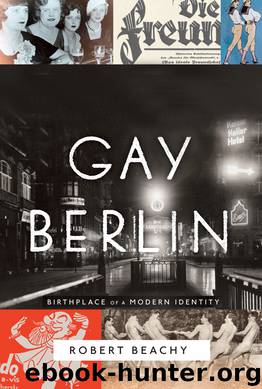Gay Berlin by Robert Beachy

Author:Robert Beachy [Beachy, Robert]
Language: eng
Format: epub
ISBN: 978-0-385-35307-6
Publisher: Knopf Doubleday Publishing Group
Published: 2014-11-17T16:00:00+00:00
Anti-Semitism was Blüher’s defensive response to the criticism he received from the Wandervogel establishment for the third volume of his study. In 1913 Dr. H. Albrecht, a leading member of one of the national Wandervogel umbrella organizations, reviewed Blüher’s three volumes and described his theories as “perverse,” “monstrous,” and “sick.” Responding to the third volume, subtitled “Erotic Phenomenon,” Albrecht claimed that Blüher had made a sexual orientation (namely, homosexuality) that “was pathological, according to the generally accepted opinion of contemporary social morality,” the basis of the youth movement. “The sexually normal,” as Albrecht understood Blüher’s claim, had no role to play, and instead only the inverts could be true “commanders of youth.” Albrecht also faulted Blüher for sending three thousand “sensational, colored brochures” advertising his Wandervogel study to all of the Prussian school directors.30
The national Wandervogel umbrella association responded to Blüher’s advertisement with its own letter, addressed to “All School Directors.” The association rebuked Blüher for his “odd views” and claimed dishonestly that the Alt-Wandervogel directorate had expelled him years earlier. The letter also claimed that they had already removed anyone who “glorified homosexual inclinations.”31 The Alt-Wandervogel directorate, which had excluded Wilhelm Jansen in 1910, responded similarly with its own missive announcing its intention to expel any remaining homosexuals from its ranks and promising that it had already banned Blüher’s publications. Only the “homo”-friendly Jung-Wandervogel umbrella committee did not attempt to discredit Blüher. Among the “respectable” Wandervogel groups, however, it was feared that school officials might ban all youth groups as “pederasts’ clubs.”32 And since Blüher’s three volumes were widely publicized, the damage had potentially been done.
As Blüher’s study gained circulation, and notoriety, the furor within the youth movement exploded. Increasingly, Blüher was not only accused of being a homosexual but also labeled “un-German,” “mixed-race,” “Jewish,” or “half-Jewish.” These attacks on Blüher coincided with an anti-Semitic radicalization of the youth movement. In June 1913 the Berliner Tageblatt reported an incident in the Saxon town of Zittau where a Jewish girl was expelled from the local Wandervogel chapter because she was not considered “German.” The article complained that any “German Jew” who otherwise enjoyed all the rights of German citizenship could be rejected as not a “real German” by the Wandervogel. The newspaper also noted that the girl’s father and grandfather had both performed military service in the German army.33
The “Zittau event” was a catalyst for a broad discussion of the “Jewish question” within the youth movement. The major Wandervogel publication Wandervogelführerzeitung (The journal of Wandervogel leadership) devoted its October edition to the relationship between “Jewry” and the Wandervogel movement. Except for one, every contribution to the special issue recommended that Jews be excluded. Typical was an article by the young engineer Dankwart Gerlach, who had joined as a fourteen-year-old in 1904 and now served as a group leader. Gerlach opined,
The justification that the Wandervogel is a German movement hits the nail on the head. It is unwise, of course, to be vehemently anti-Semitic, since that would incite the daily press like a mob at our throat….
Download
This site does not store any files on its server. We only index and link to content provided by other sites. Please contact the content providers to delete copyright contents if any and email us, we'll remove relevant links or contents immediately.
| African-American Studies | Asian American Studies |
| Disabled | Ethnic Studies |
| Hispanic American Studies | LGBT |
| Minority Studies | Native American Studies |
Cecilia; Or, Memoirs of an Heiress — Volume 1 by Fanny Burney(32558)
The Great Music City by Andrea Baker(32018)
Cecilia; Or, Memoirs of an Heiress — Volume 2 by Fanny Burney(31956)
Cecilia; Or, Memoirs of an Heiress — Volume 3 by Fanny Burney(31941)
We're Going to Need More Wine by Gabrielle Union(19046)
All the Missing Girls by Megan Miranda(16026)
Pimp by Iceberg Slim(14506)
For the Love of Europe by Rick Steves(14121)
Bombshells: Glamour Girls of a Lifetime by Sullivan Steve(14073)
Talking to Strangers by Malcolm Gladwell(13370)
Norse Mythology by Gaiman Neil(13363)
Fifty Shades Freed by E L James(13239)
Mindhunter: Inside the FBI's Elite Serial Crime Unit by John E. Douglas & Mark Olshaker(9341)
Crazy Rich Asians by Kevin Kwan(9291)
The Lost Art of Listening by Michael P. Nichols(7506)
Enlightenment Now: The Case for Reason, Science, Humanism, and Progress by Steven Pinker(7313)
The Four Agreements by Don Miguel Ruiz(6765)
Bad Blood by John Carreyrou(6621)
Weapons of Math Destruction by Cathy O'Neil(6279)
